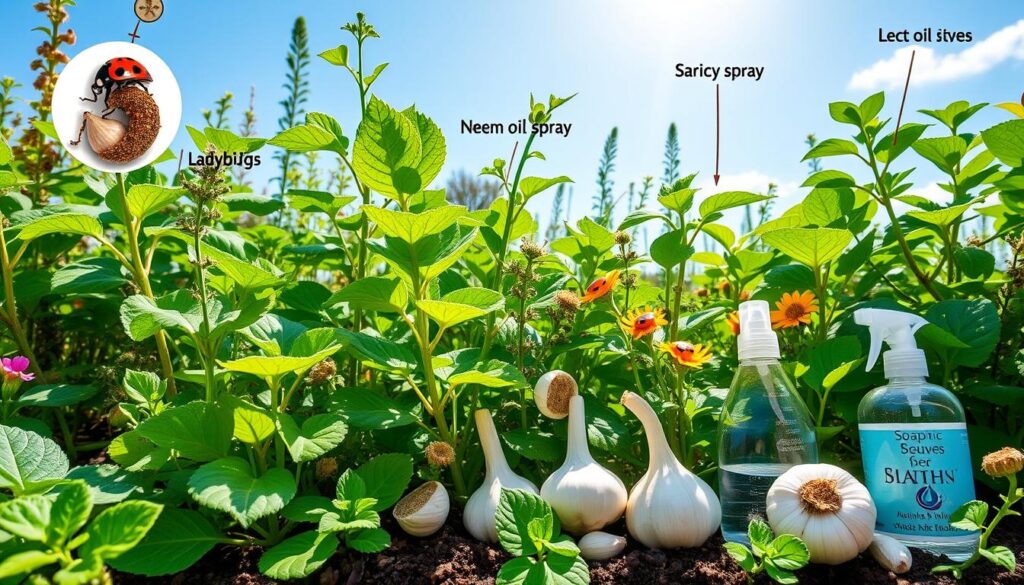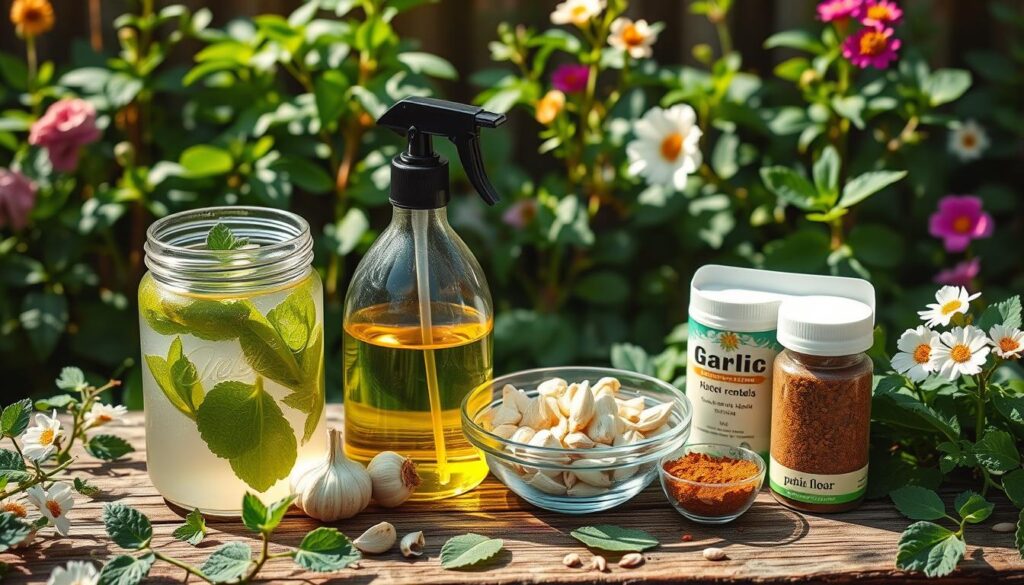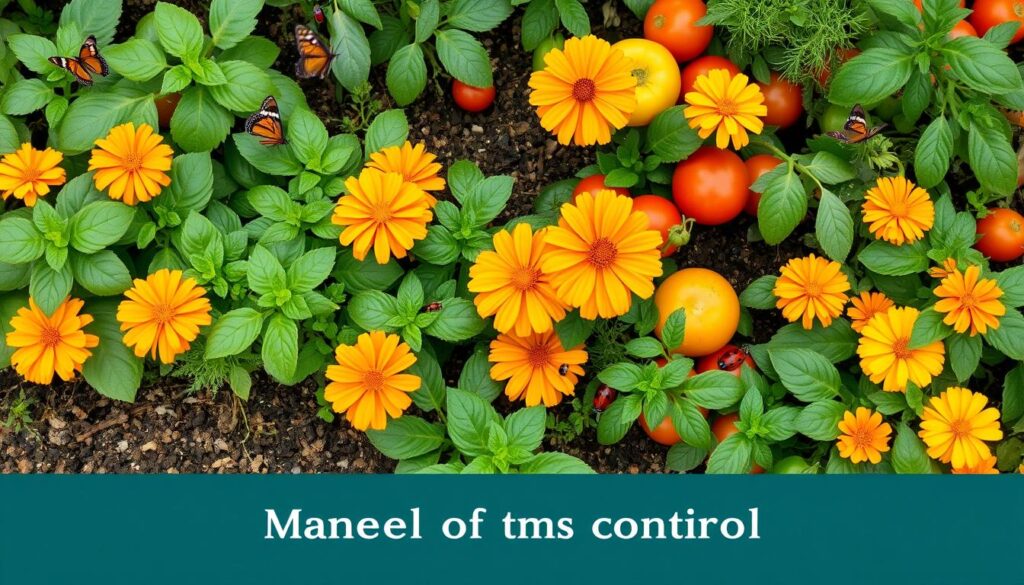Imagine a sunny Saturday morning in your backyard. You’re admiring the vibrant flowers and lush greens. But then, aphids show up, ruining the perfect scene. These tiny pests can quickly take over your garden, harming your plants.
Aphids multiply fast, covering your garden in sticky honeydew. This attracts ants and causes sooty mold. It’s a mess for your plants. Instead of using harmful chemicals, try eco-friendly ways to keep your garden safe.
In this article, we’ll show you how to fight aphids without harming your garden. You’ll learn sustainable methods to keep your plants healthy and your garden thriving.
Key Takeaways
- Aphids can quickly multiply and cause widespread damage to various plants.
- Using natural methods supports an eco-friendly approach to pest management.
- Introducing beneficial predators can effectively control aphid populations.
- Avoid harmful chemicals for the health of your garden and surrounding ecosystem.
- Simple homemade solutions can be a powerful first line of defense against aphids.
- Maintaining a healthy garden environment is key to preventing infestations.

Understanding Aphids and Their Impact on Your Garden
Aphids are tiny, soft-bodied insects that can harm your garden. There are over 4,000 species worldwide, each with different habits and looks. They can reproduce quickly, with females having up to 80 babies in weeks. Knowing the signs of aphid infestation is key to fighting them.
What are Aphids?
Aphids feed on plant sap, taking away vital nutrients. This can cause yellow leaves, slow growth, and deformed flowers and leaves. They love new growth, especially in spring. While feeding, they inject toxins that can harm plants further.
They breed fast, leading to many generations in a growing season.
Signs of an Aphid Infestation
Spotting aphid infestations early is crucial. Look out for:
- Honeydew: A sticky substance that attracts ants and causes sooty mold.
- Curling Leaves: Leaves curl or distort from aphid feeding.
- Deformed Flowers: Flowers may look misshapen or stunted.
- Visible Aphids: You can see them on leaves or stem tips.
Why Control Aphids Naturally?
Using natural methods to control aphids is best for your garden. Chemicals might kill aphids but also harm good bugs like ladybugs. Natural methods protect these beneficial insects and keep your garden balanced.
Good options include horticultural oils, neem oil, and introducing natural predators. These methods help control aphids without harming the environment or your garden’s diversity.
How to Naturally Control Aphids Without Harmful Chemicals
Keeping aphids away from your garden is key to keeping plants healthy. It’s also good for the planet. Using natural ways to fight aphids helps protect good bugs and keeps the environment safe.
Importance of Chemical-Free Solutions
Chemical pesticides are bad for the environment. They can hurt other animals and plants, and even make aphids resistant. Choosing safe ways to fight aphids helps keep the garden healthy and full of life. Aphids can quickly multiply, so it’s important to stop them early.
Eco-Friendly Pest Management Techniques
There are many safe ways to control aphids. Here are a few:
- Introducing natural predators like ladybugs and lacewings that eat lots of aphids.
- Using water to blast aphids off plants, a quick and safe fix.
- Making homemade sprays with soap or garlic to kill aphids.
- Planting certain plants like marigolds and mint to keep aphids away.
Keeping your garden clean and healthy is also important. By using these methods, gardeners can have a beautiful and safe space. This way, they can also keep aphids under control.
Utilizing Physical Removal Methods
Controlling aphids can be done effectively with physical methods. These methods are safe and don’t use chemicals. They help keep your garden healthy and eco-friendly.
Using Water to Dislodge Aphids
A strong water blast can knock aphids off plants. Use a hose to spray plants early in an infestation. This method is simple and uses only water to solve the problem.
Hand-Picking Aphids
Hand-picking aphids is a targeted way to control them. Look closely for aphids on plants and remove them gently. Make sure to throw away the aphids to stop them from coming back. This method helps keep aphid numbers down and is safe for your plants.
Pruning Affected Areas
Pruning infested parts of plants can greatly reduce aphids. Cutting off infested leaves or stems reduces where aphids can breed. This method helps your plants stay healthy and less appealing to aphids.
| Method | Effectiveness | Considerations |
|---|---|---|
| Using Water to Dislodge | High | Best when done early; may require multiple applications |
| Hand-Picking | Moderate to High | Time-consuming; precise technique needed for effective results |
| Pruning Affected Areas | High | Helps prevent further infestations; promotes healthier plant growth |
Homemade Solutions for Aphid Control
Creating homemade aphid remedies is a smart choice for gardeners. Simple solutions like soap sprays, neem oil, and essential oils can control aphids safely. Knowing how to prepare and use these methods is key to their success.
Making Soap Sprays
A soap spray for aphids is a common method. You can make it at home with just a few items. Mix a few tablespoons of liquid dish soap or insecticidal soap with a pint of water. Stir well and put it in a spray bottle.
When you spray it on plants, it kills aphids and stops them from eating. Always test it on a small part of the plant first to make sure it won’t harm it.
Using Neem Oil
Neem oil is a strong organic insecticide that stops aphids from reproducing and eating. Mix a few drops of neem oil with water and a bit of liquid soap for better mixing. Ready-to-use neem products are also available, just follow the instructions for dilution.
Apply this solution all over the affected areas to get the best results in non-toxic aphid control.
Essential Oil Sprays for Repelling Aphids
Essential oils, especially peppermint oil, are great at keeping aphids and other pests away. Mix water, a tablespoon of liquid soap, and a few drops of peppermint oil to make a spray. This spray not only keeps aphids away but also helps with ants.
Always spray essential oil sprays when it’s cooler to avoid harming the plants from heat stress.

| Solution | Ingredients | Application Method | Effectiveness |
|---|---|---|---|
| Soap Spray | Liquid soap, water | Spray directly on affected plants | Effectively suffocates aphids |
| Neem Oil | Neem oil, water, soap | Apply thoroughly on infested areas | Disrupts feeding and reproduction |
| Essential Oil Spray | Peppermint oil, soap, water | Spray during cooler hours | Repels aphids and ants |
Introducing Natural Predators
Adding natural predators to your garden can help control aphids in an eco-friendly way. Beneficial insects are key in keeping aphid numbers down without using harmful chemicals. We’ll look at how to attract these insects and why a bird-friendly garden is important for aphid control.
Beneficial Insects as Aphid Predators
Insects like ladybugs, green lacewings, and parasitic wasps are great at eating aphids. They can eat up to 50 aphids a day. To attract these helpful bugs, you can:
- Plant nectar-rich flowers like zinnias and cosmos for adult insects to eat.
- Make habitats like small rock piles or logs for lacewings or ladybugs.
- Use fewer pesticides, as they can harm these beneficial insects.
Encouraging Birds for Aphid Control
Birds are also great at controlling aphids. They eat aphids, helping to keep the ecosystem balanced. To attract birds, try these tips:
- Put up birdhouses or nesting boxes for birds to live in.
- Plant native plants that give birds food, like berry bushes.
- Use bird feeders with seeds to make your garden a welcoming place for birds.
By making your garden bird-friendly, you not only control aphids but also improve your garden’s health. Supporting both beneficial insects and birds leads to a sustainable way to fight aphid infestations.
| Beneficial Insect | Prey on Aphids (Daily Capacity) | Habitat Preferences |
|---|---|---|
| Ladybugs | Up to 50 | Open, sunny areas with flowers |
| Green Lacewings | Up to 50 | Moist environments with flowering plants |
| Parasitic Wasps | Varies | Woodlands, gardens with diverse plants |
Companion Planting Strategies
Companion planting is a smart way to fight aphids without using harmful chemicals. It means growing certain plants together to keep aphids away. Plants that repel aphids can greatly lower their numbers in your garden. By choosing the right plants, you can create a garden that naturally fights pests.
Plants that Repel Aphids
Many plants are great at keeping aphids away, making your garden healthier. Some of the best include:
- Garlic: Its strong smell keeps aphids away. You can make a garlic spray by mixing 4 or 5 cloves with 4 cups of boiling water.
- Chives: Chives’ scent repels aphids and attracts good bugs.
- Marigolds: These bright flowers keep aphids away and attract ladybugs.
- Mint: Mint’s strong smell is a big help against aphids.
- Catnip: It not only keeps aphids away but also attracts predators.
- Zinnias and Cosmos: These flowers are not only pretty but also keep aphids off.
- Nasturtium: This plant acts as a trap, drawing aphids away from your main crops.
Trap Plants for Aphid Diversion
Trap plants are another clever part of companion planting. They draw aphids away from your main crops. By using trap plants, you can control where pests go. This helps keep your garden balanced and healthy.
Using trap plants and companion planting is key to a sustainable garden. It helps manage pests and boosts the number of beneficial bugs. This approach is essential for a garden that fights pests naturally.

Maintaining a Healthy Garden Environment
Creating a healthy garden is key to fighting off aphids. Strong, well-fed plants are less likely to get infested. By following healthy garden practices, your plants will be less attractive to aphids. Regular care keeps your garden thriving and pest-free.
Keeping Plants Healthy to Deter Aphids
Healthy plants don’t attract aphids as much. To keep your plants in top shape:
- Water them right, keeping the soil moist but not soggy.
- Don’t over-fertilize to stop aphids from being drawn to leafy growth.
- Try companion planting with marigolds and catnip to repel pests.
- Use barriers like collars to block aphids from reaching your plants.
Seasonal Maintenance Tips
Each season brings its own garden tasks. Regular seasonal maintenance for gardens helps prevent aphid problems:
- Clean your garden thoroughly in early spring to get rid of pest hideouts.
- Use sticky traps to catch aphids early and stop them from spreading.
- Apply reflective mulches to confuse and scare off aphids when they’re most active.
- Plant trap crops to draw aphids away from your main plants.
Conclusion
Keeping aphids under control is key for a healthy garden. Using eco-friendly methods helps avoid harmful chemicals. You can use natural predators like ladybugs and lacewings, or make your own solutions like insecticidal soap and neem oil.
It’s important to keep at it. Aphids can quickly multiply, so you need to stay vigilant. Regular checks and tweaks to your methods will help beneficial insects grow, reducing aphids.
Using a mix of prevention, physical removal, and supporting beneficial insects is best. This approach not only protects your plants but also helps the garden ecosystem. It makes your garden healthier and reduces the need for chemicals.
FAQ
What are the signs of an aphid infestation?
Aphid infestations show up in curled or distorted leaves. You’ll also see sticky honeydew on plants and black sooty mold. Plants may grow less and look unhealthy.
How can I naturally control aphids in my garden?
To control aphids naturally, try spraying them with water or picking them off by hand. Introduce ladybugs and lacewings to eat them. Homemade sprays like soap or neem oil work well too.
Why should I avoid chemical pesticides for aphid control?
Chemical pesticides harm good bugs and upset the garden’s balance. They can also be bad for people and pets. Eco-friendly methods keep your garden and the environment safe.
What homemade remedies work best for managing aphids?
Soap sprays and neem oil solutions are great for aphids. They stop aphids from eating and reproducing. Essential oils like peppermint and clove also keep aphids away.
Which insects are considered natural predators of aphids?
Ladybugs, green lacewings, and parasitic wasps eat aphids. Adding these bugs to your garden helps control aphid numbers.
What plants can help repel aphids?
Garlic, chives, and marigolds keep aphids away. Adding these plants to your garden makes a natural barrier against aphids.
How does maintaining a healthy garden environment prevent aphids?
A healthy garden with well-fed plants is less likely to get aphids. Regular watering, feeding, and cleaning help keep aphids away.
What are some eco-friendly pest management techniques for aphid control?
Use organic sprays and remove aphids physically. Plant companion plants and attract beneficial insects. Avoid harmful chemical pesticides.
Source Links
- How to Get Rid of Aphids Naturally With 4 Treatments That Work – Garden Design
- How to control aphids with less toxic methods
- 7 Natural Ways to Get Rid of Aphids Before They Destroy Your Plants
- Aphid Control: How to Get Rid of Aphids Effectively at Home
- How to Control Aphids on Plants: Effective Strategies for a Healthy Garden
- 7 Natural Ways to Get Rid of Aphids Before They Destroy Your Plants
- Organic Methods of Pest Control for Aphids
- 10 Actually Effective Ways to Get Rid of Aphids Without Using Chemicals
- Aphids Management Guidelines–UC IPM
- Controlling Aphids Naturally
- DIY Organic Aphid Spray Recipe for the Garden • The Prairie Homestead
- 7 Natural Ways to Get Rid of Aphids Before They Destroy Your Plants
- Aphid Spray Recipes – Austral Seedlings
- 7 Natural Ways to Get Rid of Aphids Before They Destroy Your Plants
- Say Adios to Aphids: 5 Organic Pest Control Techniques
- 7 Natural Ways to Get Rid of Aphids Before They Destroy Your Plants
- Companion Plants for Aphid Pest Management
- 6 Natural Ways to Eliminate Aphids and Protect Your Plants
- Organic Pest Control for the Garden
- managing and controlling aphids
- 3 Organic Aphid Control Methods — Tested | The Beginner’s Garden
- NATURAL WAYS TO BANISH APHIDS AND SAVE YOUR PLANTS




